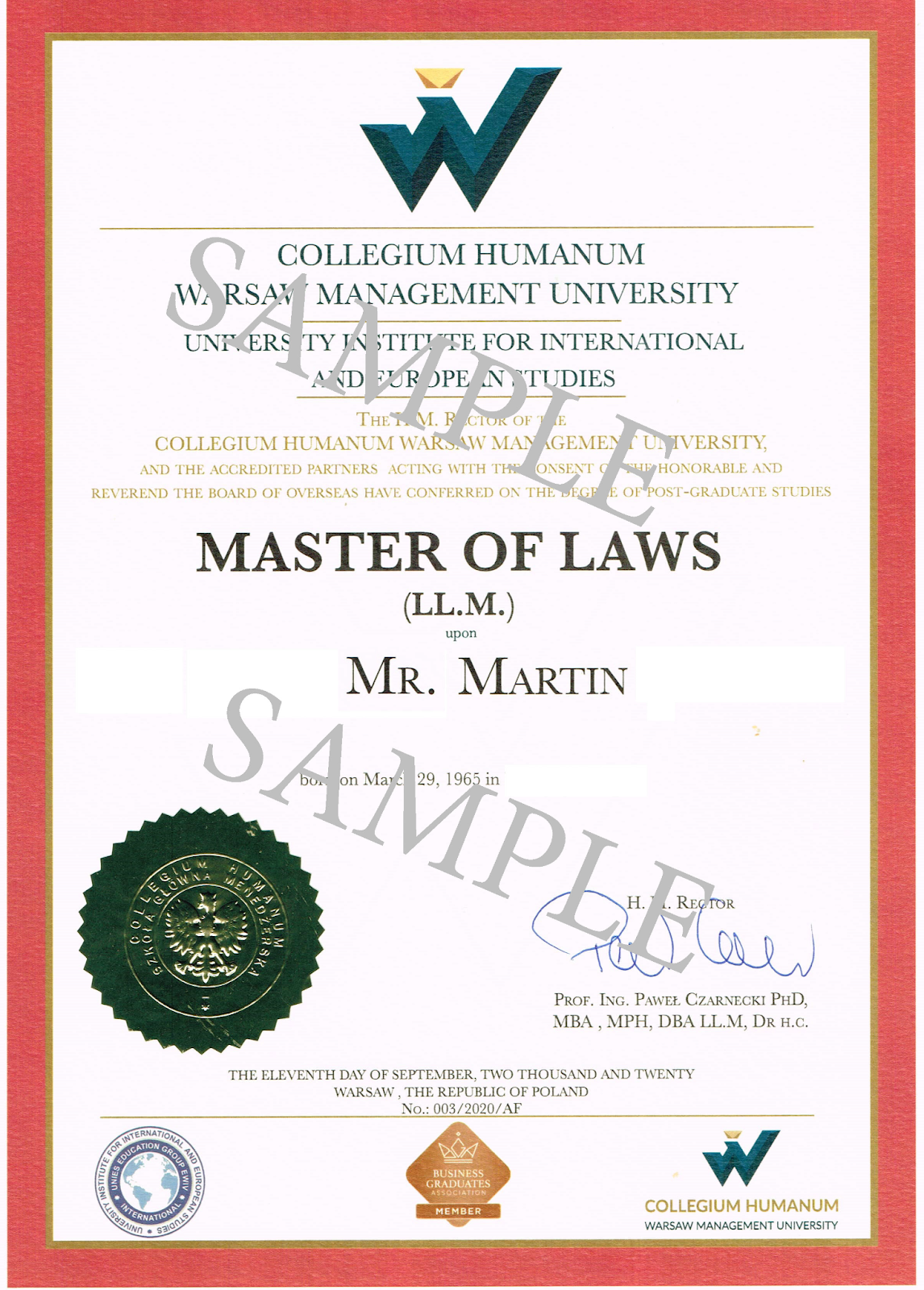In Association with

Warsaw Management University
Introduction
Have you ever been to a European country on a tour?
And at that time, have you wondered what it would be like to live and work in that country?
European countries are known for their work life balance, unlike the US. Europe also affords a really huge market, considering that the European Union (EU) is an economic and political combination of 27 countries.
But it’s not like you can board a plane and land straightaway in Europe to live and work there, right?
In order to secure any kind of work in a European country, you would need to have some qualifications and work experience that they recognise. Unfortunately, the standard specialisations in law that you would find in India aren’t something that are a skill shortage in these countries.
If you want to survive there, you would need to know the laws of these countries themselves. For this, you would probably need to study a Masters programme in these countries, right?
This is not something that everyone can manage. For one, even the second tier universities in relatively cheaper countries in Europe can be expensive for an Indian student. Consider University of Barcelona, Spain, for example, which is ranked 30 in the list of top universities in Europe (see here) can cost up to EUR3300 (approximately INR 290000) for a masters degree spanning one year.
Secondly, the costs of living in these countries can be killing, at approximately EUR 750 - 1100 per month, depending upon the country and the place where you are living.
And yet, even that is not enough, because the local lawyers would anyway be better at the local laws than you. And they would have worked for a European employer or a client.
So how do you crack this?
Actually, the pandemic already did something to change the situation.
It is the “death of geography”, as a leading newspaper in India calls it.
During the period when the pandemic cast complete terror, many organisations moved their processes online because they had to. These organisations do not have intentions to move functions which can be managed online back to the brick and mortar form anytime soon. They found that it is possible to manage these efficiently and cost effectively online and more importantly, they are not eager to leave their functioning vulnerable to take a hit again.
The internet does not have geographical borders. Cloud based systems can be equally available to someone in Europe as they would be to someone in the US, India, Singapore or Australia. Consequently, work which can be delivered by someone in Europe can be delivered by someone in India, provided they know how to do it.
At least, the industry seems to think this.
This is why you can see that the list of remote jobs and freelancing paralegal opportunities has consistently kept on increasing on job portals and freelancing sites such as UpWork, Fiverr and Freelancer.
European countries, which are fabled to be traditional, have also begun to adapt to remote or “homeworking” or “home based” legal jobs.
For example see here:

A search for ‘Home Based Legal’ jobs in the United Kingdom, gives over 1400 jobs as a result, just on one website - Indeed.
You already have the advantage of talent arbitrage, because a lawyer in India would cost far less than minimum wage regulated European countries.
Specialisation: Business Laws and Commercial transactions
No business in the world can afford to exist in complete ignorance of the applicable law. Conversely, no lawyer in the world can be really successful without understanding what businesses want.
This is universal.
Although the usual belief is that law is local and lawyers in one country cannot understand the law and legal systems in another, there is no reason why legal work which is based on business functions and objectives cannot be undertaken internationally.
Let’s pause for a moment and think here: do the objectives of businesses and founders change, depending upon the geography? Don't the majority of businesses in the world aim for profit and / or growth?
Don’t the founders of for-profit businesses aim to maximize profits, without falling prey to faulty processes and hefty fines?
Aren’t the lawyers supposed to guide the founders how to achieve this?
If this is the objective of a lawyer, he or she should be able to undertake any legal function which does not require a physical presence, for any business in the world.
The style of drafting contracts may differ, but the negotiations of terms remain the same globally. If you’re drafting a shareholders agreement, to a large extent, the commercial intentions of the founders and investors remain the same, be it India or Europe or US or UK. And the commercial intentions are what get boiled down into terms.
Corporate Governance principles remain the same everywhere. You can find multinational companies having internal policies applicable to all of their subsidiaries throughout the globe.
But for this to materialize, it is essential that a lawyer understands the way a business operates, the organs of a business, its assets, its objectives and transactions very well.
Why does a degree from a Polish university make sense?
Poland has emerged as the new outsourcing destination with banks, law firms, professional services companies, multinational financial institutions and global conglomerates looking to move more complex tasks out of their head offices to Central Eastern Europe. With Poland's (cities like Warsaw, Wroclaw, Krakow, Gdansk) proximity to western capitals, EU membership, large talent pool and lower costs, it has now become the financial hub. With Brexit, companies are looking at other cost friendly options which would grant access to the EU's single market.
Law Firms are also shifting base to Poland so as to have access to the EU's legal and regulatory framework. Poland is now beginning to pose a challenge to India as the financial services industry’s preferred location for back-office functions.
Poland's experienced professionals, deep and rich job market, predictable employment and labour laws, low labour cost, flexibility in work organisations and strategic location have made it a true leader in the European SSC/BPO sector. For western companies, the attraction of outsourcing to Poland is the chance to cut costs without cutting expertise.
Deutsche Bank, State Street, Toshiba, Sony Pictures, Bayer, ThyssenKrupp, Arla, Wipro, Staples, PwC, Lufthansa, Thomson Reuters, Cognizant, Jones Lang LaSalle, HSBC, Credit Suisse, Goldman Sachs, UBS, RBS, JP Morgan Chase & Co, BNY Mellon, ABSL, Royal Dutch Shell, Amazon, Procter & Gamble, Citi group, Accenture, Hewlett-Packard, Infosys, IBM, Motorola, CapGemini, Dentons Law Firms, Linklaters (law firm), Baker McKenzie (law firm), DLA Piper (law firm), White & Case LLP (law firm) are few companies/firms who have offices in Poland and have generated close to 300,000 employment opportunities.
With Poland becoming the new hub for shared service centers, there will be huge demand for people who have studied from a university there, especially people with knowledge of international business laws, commercial transactions, international trade and taxation. Europe is a promising destination for law graduates to pursue international law, especially international trade law, mostly because of the significance of the region and its contribution to international trade. An LL.M from Warsaw would open a host of opportunities for graduates looking at the above scenario.
If I were to just stay in India, how important is the knowledge of international business laws and commercial transactions or international trade and taxation for the management of an Indian organisation?
Considering the accessibility of markets, many businesses will look outside of their countries for markets, for capital, for affordable talent etc.
This has already started to happen.
You can find businesses being initiated in a country with the sole objective of serving customers in another country, without having any regards to the local scenario.
Have a look at the top 10 Indian startups listed here. Out of 10, barring Udaan, Agnikul Cosmos and Playment, 7 have already expanded outside India or founders have been publicly quoted stating they have expansion plans. Playment was recently acquired by TELUS, a Canada based company in July 2021. Almost all of them have or had foreign investors.
Consider the Indian unicorns which have lined up for an IPO in 2021 and you will find that a majority of them already have global operations and almost all have foreign investors.
This kind of surge in cross border operations will necessitate lawyers who are aware not only of the local laws applicable to a business, but also the laws of other countries to which these businesses plan to expand.
The signs are very clear. If you want to score with these companies, you will need to be equipped with knowledge of international trade, business laws and international taxation. Local knowledge will give you a limited scope.
The more multi-jurisdictional legal knowledge a lawyer has, the more they will be in demand.
Is a Masters degree useful to me if I am a local practitioner?
Not an ordinary masters degree maybe, but one from an international university and one reflecting knowledge in international business laws is.
It brings instant reliability to your profile if you quote a degree from an international university, especially if you are serving clients which either have multinational operations or are looking to expand internationally.
About Warsaw Management University

The Warsaw Management University is one of the oldest universities in Poland. About 80,000 Polish and international students have graduated from it since its foundation 20 years ago.
Collegium Humanum – Warsaw Management University is an international private university with its seat in ul. Moniuszki 1A, 00-014 Warszawa, has been authorized by the Minister of Science and Higher Education, as a higher education institution with the name Warsaw Management University.
The UNIES Business School has been founded by cooperation agreement of CH Warsaw Management University (Poland) with UNIES EWIV (Germany). UNIES Business School of CH-Warsaw Management University has become a Business School of WMU for the delivery of WMU´s undergraduate and postgraduate programmes of studies in the international market at offshore-campus and training centres in Asia, Africa and Europe.
Collegium Humanum is a member of the Business Graduates Association, which is an international membership and quality assurance body of world-leading and high-potential Business Schools who share a commitment for responsible management practices and lifelong learning, and are looking to provide positive impact on their students, communities, and the economy as a whole.
Since 2020, Collegium Humanum has been a signatory to PRME (the Principles for Responsible Management Education),an international forum of leading business universities from around the world operating under the auspices of the United Nations, whose aims are to shape global attitudes of social responsibility among future leaders across business, politics and other dimensions of public life.
The School is offering a one month immersion program too, at an additional cost.
How is this course different from other LLM programs?
Immersion
An immersion program at the campus of Warsaw Management University/neutral venue can be offered to the candidates looking at the demand for the same from the students. The fee for the same will be in addition to the tuition fee.
Who should take this course?
The Master of Laws (LL.M.) in Business Laws and Commercial Transactions in association with Warsaw Management University is a specialized program designed for individuals with a keen interest in the intersection of law, business, and commerce.
Here are key points outlining who should consider enrolling in this program:
- Law graduates seeking to deepen their expertise in business and commercial law, and expand their career opportunities in this field.
- Practicing lawyers, including corporate lawyers, in-house counsel, and litigators looking to specialize in the complex world of business law and transactions.
- Business executives, managers, and entrepreneurs who want to gain a strong legal foundation to make informed business decisions and navigate complex legal issues.
- Aspiring or established entrepreneurs seeking to understand the legal framework that governs business operations and transactions to ensure compliance and mitigate risks.
- Professionals responsible for ensuring their organizations adhere to regulatory and legal requirements in the business sphere.
- Financial advisors, consultants, and analysts interested in understanding the legal implications of financial transactions and investments.
- International students looking to study European business law and understand the legal aspects of conducting business in the European Union and globally.
- Government officials and policymakers involved in crafting and implementing regulations related to business and commerce.
- Individuals from diverse educational backgrounds looking to transition into a legal career or explore opportunities in the business and commercial law sector.
This LL.M. program offers a well-rounded education in business laws and commercial transactions, equipping graduates with the knowledge and skills needed to excel in various roles within the legal and business domains.
It equips them with the knowledge and skills required to address complex legal challenges in today's global business environment.
What will you learn from this course?
In the LL.M. in Business Laws and Commercial Transactions program offered in association with Warsaw Management University, you will gain a comprehensive understanding of various aspects related to business laws and commercial transactions.
This course is designed to equip you with the knowledge and skills necessary to excel in the dynamic and complex field of global trade and taxation.
Throughout this program, you will:
- Gain in-depth knowledge of business laws, covering a wide range of topics such as contracts, torts, and intellectual property, enabling you to navigate complex legal challenges in the business world.
- Develop a profound understanding of commercial transactions, including mergers and acquisitions, international trade, and financing, and learn how to structure and negotiate deals effectively.
- Learn to identify, assess, and mitigate legal risks in various business scenarios, ensuring that your future employers or clients operate within legal boundaries.
- Explore the principles of corporate governance and ethics, and understand how to advise businesses on compliance and ethical decision-making.
- Delve into international business law, including trade regulations, investment treaties, and cross-border dispute resolution mechanisms, preparing you to work in a globalized business environment.
- Acquire expertise in financial regulations and taxation laws, enabling you to provide legal counsel on financial transactions, tax planning, and compliance.
- Understand the intricacies of employment and labor laws, including employment contracts, workplace discrimination, and labor disputes, crucial for managing personnel in any organization.
- Develop advanced research and analytical skills to interpret and apply complex legal precedents, statutes, and regulations effectively.
- Explore the ethical obligations of legal professionals and understand the importance of maintaining professional integrity in the practice of law.
- Apply your knowledge through real-world case studies, internships, and practical exercises to gain hands-on experience in solving business law issues, preparing you for a successful career as a business lawyer or legal consultant.
By the end of this LL.M. program, you will have the skills and expertise needed to excel in the field of business law and commercial transactions, whether as a legal practitioner, corporate counsel, or consultant.
Training Methodology

Online 24/7 access
Access study materials via our online portal & via our anroid & iOS apps.

Practical Exercises
Two practical exercises every week, each followed by written feedback.

Live Online Classes
Live online classes based on exercises, allowing questions and feedback.

Convenient Class timings
Classes held after work hours, typically on Sundays or after 8 PM on weekdays.

Live Doubt Clearing
Live doubt clearing for support and one-on-one sessions with mentors.
What is the career potential after doing this course?
A Master of Laws (LL.M.) in Business Laws and Commercial Transactions, offered in association with Warsaw Management University, is a prestigious and specialized program that equips graduates with advanced legal knowledge and skills in the field of business and commercial law.
This course offers a multitude of exciting career prospects, as it prepares students for a range of roles in both the legal and business sectors. Here's an overview of the career potential after completing this program:
- Graduates can pursue careers as in-house counsel for corporations and businesses of all sizes. They advise on legal matters, contracts, compliance, and regulatory issues within the organization.
- Many law firms seek professionals with expertise in business and commercial law to handle their corporate clients' legal needs. LL.M. graduates can join these firms as associates, focusing on transactional work, mergers and acquisitions, or corporate litigation.
- Businesses are increasingly focused on compliance with local and international laws and regulations. LL.M. graduates can work as compliance officers, ensuring that their organizations adhere to legal requirements and avoid legal risks.
- For those interested in entrepreneurship, this degree provides a strong foundation in business law, making it easier to navigate the legal complexities of starting and running a business.
- Graduates can specialize in banking and finance law, working for financial institutions, investment firms, or regulatory agencies to handle legal aspects of financial transactions and regulations.
- With the global economy becoming more interconnected, LL.M. graduates can work in international trade law, advising on cross-border transactions, trade disputes, and compliance with international trade agreements.
- Government bodies and regulatory agencies often require legal experts to draft and enforce business-related regulations. LL.M. graduates can work in various capacities within these organizations.
The Master of Laws (LL.M.) in Business Laws and Commercial Transactions from Warsaw Management University is a valuable qualification that opens doors to diverse and rewarding career paths.
Graduates are well-equipped to meet the evolving demands of the legal and business landscape, making them highly sought after in a variety of professional settings.
Ultimately, the career potential is extensive, offering opportunities for both specialization and broad expertise in the dynamic world of business law.
How can you help businesses and clients after you obtain an international LLM degree?
Here are 7 ways in which you can help businesses and international clients with the following after you complete this course:
Advise on market entry/expansion strategy
This is the first question faced by an entity planning to go international - where to begin from, what destination to select based on specific objectives. As someone who is trained in different aspects of international business laws, you will be able to inform an employer or a client about which country will offer the most suitable legal environment keeping their objectives in mind. You will also be able to inform them about multiple entry options and the legal formalities required for their selected option.
Incorporate entities in multiple countries and determine corporate governance structures
When you have an idea of the different business structures available in a country, the procedure to incorporate entities in that country and also determine the corporate governance structures that can be applied not only for the holding company, but also the subsidiaries in different countries, this would be invaluable information for an employer or a client.
It will also give you an edge over consultants who can take the benefit if you are unaware how easy or difficult the procedures in that country are.
Negotiate, draft and review contracts for multiple transactions
Transactions are at the heart of any business. When you understand a business’s source of income and its transactions, you would be able to negotiate and review contracts for that business much better. With a Masters degree which gives you an all round view of multiple business aspects, you will understand the transactions much better.
For instance, you will have the knowledge of what representations and warranties should be asked for, in an investment contract with a company having significant intellectual property, because you will understand how the monetisation and protection of intellectual property works.
Help companies with their data protection compliance
This is going to be a highly demanded skill, considering the explosion of cloud based and SaaS companies during and post the pandemic. More and more countries are strengthening their data protection laws and if you can develop a company’s systems and processes to ensure compliance with these, it can make you a very desirable candidate for multinational companies.
Help companies with cross border mergers and acquisitions
Here’s a Bloomberg report which talks about cross border M&A breaking records for the first quarter of 2021. As geographical barriers thin down, these transactions are only going to increase. Anyone who is skilled in how M&A transactions work, especially cross border mergers will thrive.
Help companies with securing finance for international trade and completing customs and border protection related procedures and documentation
As e-commerce businesses thrive and international trade expands, there will be a consistent requirement for trade financing and consequently, professionals who understand how imports and exports work and are regulated in different countries will also be required.
Given that we have twice been hit by pandemic waves, customs and border protection regulations will likely be tighter around imports from other countries. For example, as of July 2021 there are quite a few countries which wouldn't accept post from India. However, they will accept couriers from DHL. Why? Because multinationals like DHL are well aware of the safety requirements for packages being shipped to these countries. Knowledge of customs clearance requirements helps. Do you think companies like DHL would benefit from having professionals who are aware of such requirements and formalities? Definitely.
International tax structuring for multinational companies
The Double Irish Dutch Sandwich or the Single Malt tax structures (now redundant) weren’t the only tax structures to be used. There are probably many more like these, waiting to be discovered by the Governments of the relevant countries. Whoever thought of these structures must have had the thorough knowledge of the tax laws and charging events of multiple countries. Do you think multinational companies would want such people who can help them structure their transactions to save millions of dollars in tax in many countries perfectly legally? It’s a no brainer.
Potential Employers and Clients
- Multinational companies
- International law firms
- Startups with global expansion plans
- Practically, everyone entering into a cross border contract or transaction
Business teams that you can work in
Upon completing the LL.M. in Business Laws and Commercial Transactions program in collaboration with Warsaw Management University, graduates can explore a variety of professional avenues. These career paths include:
- Graduates can pursue a career in legal practice, specializing in international trade and taxation law.
- Professionals can choose to work in compliance and regulatory departments within multinational corporations or government agencies.
- Graduates may opt for roles focused on policy analysis and development, where they can influence Business laws and commercial transactions at the national or international level.
- Graduates with expertise in Business laws and commercial transactions can assist companies in developing and executing strategies for expanding their global operations.
- LL.M. graduates can aspire to leadership positions within multinational corporations, serving as Chief Legal Officers (CLOs) or joining the management team.
- Additionally, graduates can leverage their expertise to explore entrepreneurial opportunities, either by establishing their own startup focused onbusiness laws and commercial transactions, joining early-stage startups as key legal advisors, or offering consultancy services to businesses seeking guidance in these areas.
The LL.M. in Business Laws and Commercial Transactions program equips students with the knowledge and skills needed to excel in these diverse career paths, making them valuable assets in the dynamic field of international business and law.
What kind of recruitment and placement support will I get?
- Unique Training Method: We're the sole organization in India offering comprehensive, exercise-based courses.
- Employer Recognition: Many leading employers, law firms, and companies actively seek our high-performing students.
- Career Opportunities: Success in our courses can lead to job placements, internships, and assessment internships in esteemed law firms, with renowned lawyers, and various companies.
- Empowering Learners: We focus on empowering learners with not just knowledge and skills, but also real-world opportunities.
- Dedicated Support Team: Our dedicated team is here to assist you with placements, internships, and freelance opportunities.
- Proven Success: Between April 2021 and June 2023, we've helped over 21,000 students secure job and internship opportunities.
- Media Recognition: Our achievements have been featured in respected media outlets like The Hindu, Business World, and India Education Diary.
- Impressive Value: Our students have secured over Rs. 2.7 Crore (USD 330,000) worth of work, with records of INR 30 LPA (USD 37,500) domestically and INR 50 LPA (USD 62,500) internationally.
- Comprehensive Support: From day one, our placement team guides you in setting goals, crafting standout CVs, enhancing interview skills, and supporting your critical first month on the job or during an internship.
- Trusted Recruiters: We've built strong collaborations with recruiters who prefer hiring our well-trained students.
- Competitive Edge: Partnering with us gives you an edge in the job market and opens doors to exciting career prospects.
Can I get remote freelance work after doing this course?
At LawSikho, we have two types of students: those who already possess good legal skills and those who are in the process of learning. We believe in enabling our learners to start earning from their knowledge without delay.
For students with professional-level legal skills, we offer opportunities in contract drafting, data & privacy, international business law, US immigration law, litigation support, and international IP law work, etc.
However, we understand that acquiring professional-level skills takes time. For those who are still developing their legal skills, we provide alternative work opportunities such as writing articles, conducting research, legal transcription, data entry, law firm administration, social media management, and more. Some students even engage in tasks like voice-over work, data compilation, translation, and virtual assistance.
We have established a dedicated team that actively pitches to organizations in the US to help LawSikho students find remote work.
We have set up a US entity to bridge the trust gap between US legal professionals and an organization operating from India.
We focus on getting learners their first three clients, guiding them in crafting impressive proposals. By the time they secure these initial clients, learners become well-adjusted to the process and can independently attract more clients.
They build their CVs and profiles with real work experience and testimonials, opening doors to numerous opportunities.
Getting started is often the hardest part, but at LawSikho, we make the process frictionless. We have witnessed law students earning well over $1000 per month.
Some students have earned $500 in their first month as a side gig. We have students who, after a year, now earn $10,000 per month. While some may start with $300, they make progress by learning new skills, improving their profiles, and pitching for higher-paying work.
Between April 2021 and June 2023, we created over 21000+ opportunities for our learners, resulting in thousands of students securing freelance work. The total value of work secured amounts to over $3,30,000 (Aprox INR 2.7 Crore). Additionally, hundreds of individuals found employment, and secured internships.
Please note that these numbers represent the initial gigs facilitated directly by us or those on which we actively collaborated with the learners. Students have also secured additional work beyond our tracking.
How will you clear my doubts and help me if I am struggling to understand or learn a concept?
- In our live classes, you can ask questions, share your screen, receive personal feedback, and have your doubts cleared.
- If you need more help after getting feedback on an assignment or want career advice, you can schedule a private one-on-one call. Our evaluators and mentors are here to assist you and give you advice that's tailored to your needs.
Money back guarantee
If you take this course, follow it diligently for a month, do all the exercises but still do not find value in it, or not able to understand or follow it or not find it good for any reason, we will refund the entire course fee to you. It is a 100% money-back guarantee with only one condition, you must pursue it properly for a month. If you don’t find it valuable after that, get your entire money back.
Sample Degree Certificate
(Note: The certificate issued will contain details of your chosen specialization)

Weekly Assessments
- Weekly practice exercises to learn international work in simulation mode in a safe environment, with in-line feedback from evaluators spread over 13-15 weeks each semester.
- Personalised feedback and mentoring sessions to handhold through the assessments.
- Three years to finish the assessments and be eligible for the degree.
- Access to course materials for five years.
- Weekly exercises to be a combination of drafting, writing, multiple-choice questions and vivas spread over four semesters in 78 credits.
Core Subjects
Subject 1: Introduction to Legal Systems Across the World and Hierarchy of Courts (4 Credits)
Legal systems around the world - common law and civil law
How are international disputes resolved: Framework and mechanisms
Overview of courts system for commercial disputes in different countries
- US
- UK
- Europe, with focus on Germany, France and Netherlands
- Canada
- Brazil
- India
- UAE
- Singapore
- Japan
- Hierarchy of courts for commercial disputes
- Specialized commercial courts/ commercial divisions
- Availability of small claims courts and fast-track procedures
- Caps
- Procedural Simplifications
- Can Parties Represent Themselves
- Availability and criteria for pretrial attachment of movable assets
- Automatic & Random Assignment of Cases to Judges
- Evidentiary weight of a woman’s testimony
Case management
- Timelines for following processes under civil procedure laws
- service of process;
- first hearing;
- filing of the statement of defense;
- completion of the evidence period;
- filing of testimony by expert; and
- submission of the final judgment
Restrictions on number and circumstances of adjournments
Public availability of performance measurement reports to monitor progress of cases and compliance with timelines
Use of pretrial conferences for case management
- scheduling (including the time frame for filing motions and other documents with the court);
- case complexity and projected length of trial;
- possibility of settlement or alternative dispute resolution; exchange of witness lists;
- Evidence;
- jurisdiction and other procedural issues; and
- narrowing down contentious issues
Availability of electronic case management systems for various processes
- access laws, regulations and case law;
- access forms to be submitted to the court;
- receive notifications (for example, e-mails);
- track the status of a case;
- view and manage case documents (briefs, motions);
- file briefs and documents with the court; and
- view court orders and decisions in a particular case
Automation of court proceedings
- Possibility of electronic filing procedures without in-person interaction
- Electronic service of complaint on the defendant
- Electronic payment options for court fees
- Public availability of judgments rendered by local courts
Which alternative dispute resolution methods are used to resolve international disputes?
Which resources can you use to find out about legal systems in a country?
Subject 2: Advanced Contract Drafting (8 Credits)
Contract Anatomy - Introduction to parts of a contract
- The different parts of a contract, and the sequence in which different clauses customarily appear in a contract
- The categories to which each clause in a contract pertains
- The Definitive Contract Drafting Checklist
Title, recitals, definition and interpretation clauses
- The relevance of the introductory parts of a contract
- How are introductory clauses drafted
Representations and Warranties clauses and covenants
- What are representations and warranties and why are they required?
- Tips and strategies in drafting representations and warranties clauses
- The consequences of false representations
- What are covenants?
Conditions Precedent, Conditions Subsequent and Completion
- The concept of conditions precedent and the relevance of the conditions precedent clause in a contract
- Conditions subsequent and completion
- The consequences of breach of conditions precedent and conditions subsequent clauses
- How to draft the conditions precedent, conditions subsequent and completion clauses
How to Draft Obligations and Payment Clauses in Any Contract
- The relevance of the obligations and payment clauses
- How payment and increment clauses are drafted
- The consequences of default in payment
- How should consideration clauses be drafted?
Term, termination, renewal and survival clauses
- How to decide the ‘term’ of a contract and draft the ‘term’ clause
- How termination is connected with the term of the contract and how to draft termination clauses
- The different methods by which a contract can be renewed
- Which obligations under the contract continue to be applicable even after termination?
Assignment and Change of Control Clauses
- Which rights in an agreement can be assigned and which ones can be retained
- How anti-assignment clauses work
- The significance of the ‘change of control’ clauses and how these work
- Is revocation of assignment possible?
Confidentiality, non-compete, non-solicit and exclusivity clauses
- The concept and the need for confidentiality, non-compete, non-solicit and exclusivity clauses
- How to draft an effective confidentiality clause
- In which situations can a non-compete clause be enforced?
- Cases where non-solicit and exclusivity arrangements are used
- What are non-circumvention clauses?
Waiver, Variation and Severability clauses
- What are ‘no-waiver’ clauses?
- Why are variation clauses required?
- What are severability clauses used for?
Indemnity and Limitation of Liability clauses
- The concept of an indemnity clause and the reason why it is required in a contract
- Situations when an indemnity clause can be triggered
- How to draft an effective indemnity clause
- Difference between an indemnity and a guarantee
- The effect of Limitation of Liability clauses
Notice and communication clauses
- Drafting a notice as per the notice clause
- Why it is important to provide for a receipt mechanism in a notice clause
Breach and enforcement related clauses
- The concept of breach and what kinds of scenarios amount to a breach
- Consequences of breach which can be specified in a contract
- Legally permissible remedies in the event of a breach
- Whether to draft a breach clause as a general or specific clause
- Types of liquidated damages clauses which are permitted under Indian law
- What care should you take while drafting a breach clause
- What is the difference between a breach and an indemnity claim?
- How to quantify damages for infringement or other breaches
Governing Law in international contracts: How to choose the applicable governing law?
- The relevance of the Governing Law and jurisdiction clause
- Learn how the Governing Law and jurisdiction clauses should be drafted
What do you need to take care of in order to ensure enforceability of contracts in accordance with the relevant law?
- Does it require execution in a particular manner?
- Does it require approval from a specific authority in accordance with the law?
- Legalisation requirements - stamping, notarisation, apostille
- Reasonability in clauses
- Appropriate choice of governing law
Ten contracts which are universally used in business transactions and how to draft them
- Confidentiality Agreements / Non-disclosure Agreements
- Employment Agreements
- Lease Agreements
- Licensing Agreements
- Power of Attorney Document
- Sale / purchase Agreements
- Distribution Agreements
- Loan Agreements
- Joint Venture Agreements
- Website Development Agreements
Different types of notices / letters which can be used in international contracts
- Notice of claim in a works contract
- Notice to cure defect
- Notice of breach
- Notice invoking force majeure
- Notice to commence negotiation
- Notice claiming service credit
- Notice claiming indemnity
- Notice of commencement of arbitration
- Letter of renewal/ extension
- Letter of waiver
- Addendums / Novation Agreement / Amendment agreement
- Notice demanding payment
- Response notice rejecting claim of service credit
- Response notice rejecting force majeure invocation
- Response notice denying indemnity
- Response notice denying payment
Subject 3: International Contract Negotiation (2 Credits)
Basic principles of International trade and commercial law and how international contracts work
Introduction to Negotiation
- The key concepts of negotiation;
- How to use power in negotiations;
- How to strategically prepare for a negotiation;
- The fundamental negotiations strategies and tactics;
Negotiating to win
- The art of persuasion: framing to achieve a desired effect and outcome;
- Managing diversity: negotiating with people whose cultures, backgrounds and expectations differ from your own;
- Conducting virtual negotiations.
Common negotiation techniques and pitfalls
Hostage negotiation techniques and business applications
Negotiation case studies
Negotiation as a method of dispute resolution
Subject 4: International conflict management: Mediation, Conciliation, Expert Determination and Anti-Suit Injunctions (4 Credits)
Introduction to international Conflict Management
- Various definitions of conflict
- The Cognitive, Emotional and Behavioral levels of conflict management
- The determinants of conflict on the example of the Wheel of Conflict
- The four personality types and their influence on conflict occurrence, development and resolution.
Individual conflict management strategies
- The importance of verbal, non-verbal and para-verbal communication and the factors influencing conflict;
- How to manage diversity in conflict situations;
- Alternative Dispute Resolution: the multiple roles of the lawyer as a mediator in the face of conflict.
Introduction to Mediation/Conciliation
- Definitions and difference
- Advantages over other ADR
- Importance and expected/ objective role in ADR to resolve disputes
- Recognition and enforcement of dispute resolved in mediation
- International Commercial Mediation & Conciliation (Recent Trends)
- Singapore Convention on Mediation
- UN Model Law on International Mediation and Conciliation
- Transactions/ disputes most suited for mediation
- Psychology for mediator and conciliator and Advocates
Institutional mediation/ conciliation and procedure
- Procedure for mediation in SIAC, HKIAC, DIFC, LCIA, AAA
- Mediation-arbitration combinations: Arb-med, Med-arb and arb-med-arb and how these are used effectively by lawyers
- When mediation can be chosen
- Steps to be taken for mediation with respective institution
- Can these institutional facilities be used only for mediation and not for arbitration or are they always used in conjunction with each other?
- Enforceability
- Costs of mediation
- Credit of fees to arbitration procedure in case mediation/conciliation fails.
Expert Determination
- Sectors where expert determination clauses are relevant
- How to draft expert determination clauses
When and how to use anti-suit injunctions
- How does an anti-suit injunction work?
- When should you use anti-suit injunctions
- Anti-suit injunctions in the context of international contracts
Subject 5: International Commercial Arbitration (8 Credits)
Introduction to International Commercial Arbitration
- Why is International Commercial Arbitration a preferred mode for dispute resolution in international transactions?
- Legal work in international commercial arbitration for in-house counsels, corporate lawyers, arbitration lawyers and litigators
- How to navigate the domestic and offshore legs of International Commercial Arbitration
- What you need to know about foreign law to be effective in international commercial arbitration
- How to brief offshore counsel with respect to arbitration proceedings
- How international commercial arbitrations can be institutionalised and what are the important organisations in this area?
- Ad hoc v International Arbitration
Seat and Venue in Arbitration
- What are the key considerations in selection of the set of arbitration rules that will govern a dispute between contracting parties?
- How do these vary in case of ad hoc arbitration vis-a-vis institutional arbitration?
- UNCITRAL Arbitration Rules
How to draft an Arbitration Clause in International Commercial Arbitration?
- How to apply the seat and venue consideration and remove uncertainty while drafting an effective and predictable arbitration clause.
- Case studies of some well drafted and not so well drafted arbitration clauses.
- Arriving at a Model Arbitration Clause for International Contracts and how to modify it as per applicable factual situation
- Components of clauses in International Commercial Arbitration.
- Institutional Arbitration Model Clauses for SIAC, HKIA, DIFC-Dubai, LCIA and AAA.
- Pathological arbitration clauses.
- Important components of an arbitration clause.
- Why do clauses say ‘without reference to conflict of laws rules’?
- Importance of ‘good faith’/ reasonable endeavor requirements.
- Choice of law
How to Select an Appropriate Institution for International Commercial Arbitration?
- How to answer common questions that every client faces about selection of seat, selection of arbitral institution and choice of law
- Special emphasis on following Arbitration Institutions
- International Court of Arbitration
- London Court of International Arbitration
- Singapore International Arbitration Centre
- Hong Kong International Arbitration Centre
- International Centre for Settlement of Investment Disputes
Implications of choice of contract law of Singapore, UK, US, Canada and India
- UK contract law for international arbitration lawyers
- US contract law for international arbitration lawyers
- Singapore contract law for international arbitration lawyers
- Canadian contract law for international arbitration lawyers
How to Draft a Statement of Claims
- How to define the dispute
- Quantification of Damages
· To what extent are liquidated damages valid?
· What if the amount of liquidated damages specified is very high?
· Is there some prohibition against inclusion of penalty clauses?
· Are indirect and remote damages enforceable?
· Is there a duty of the party suffering loss to mitigate damages?
· Are punitive damages, if agreed contractually, valid?
Types of reliefs
- Monetary compensation
- Punitive damages/ penalties
- Interpretation of contracts
- Restitution
- Is declaratory relief relevant?
- Interest
- Costs
- Do national laws constrain this?
How to define the statement of defense in international commercial arbitration
Top strategies to rebut claims made in the statement of claims in the statement of defense
How to review foreign laws and international conventions for challenge procedures
Common grounds for challenge
Challenge to enforcement of foreign awards in India
How to obtain anti-arbitration injunctions in the jurisdictions above
Templates
Letter to invoke arbitral proceedings before LCIA, ICC, SIAC
Notice of commencement of arbitration
Statement of claim
Statement of defence
Subject 6: International taxation and transfer pricing work (4 credits)
- Sources of international taxation and DTAAs
- Structure of DTAAs
- What is Permanent Establishment?
- Does international tax law apply to you if you don’t have an office offshore
- Do commissionaire arrangements constitute a permanent establishment?
- How does foreign tax credit work?
- Controlled Foreign Corporations and POEM Rules
- Safe Harbour Rules
- Tax structuring, Base Erosion and Profit Shifting (BEPS)
- Transfer pricing - introduction and basics
- Transfer pricing compliance, disputes and penalties
- Transfer pricing methods: an overview
Subject 7: Foreign Investment (FDI and Portfolio Investment) and Exchange Control Framework of 10 most important global economies (4 credits)
Regulation of foreign direct investment in major global economies?
- Investment in capital (unlisted incorporated entities, unincorporated businesses)
- Investment in property in a country
Regulation of foreign portfolio investment (investment in listed equity) in major global economies?
Investment in foreign exchange derivatives
Is investment in cryptocurrency regulated under exchange control laws?
How is foreign exchange inflow on account of business expenses regulated?
Types of foreign investment in debt and how it is regulated
- Long term and secured lending
- Investment in short term debt and money markets
- Investment in long term and short term debt instruments
Regulation of outbound investment and outflow of foreign exchange
- On account of expenses
- On account of investment in capital
- On account of investment in property
- On account of investment in debt
Creating contingent liability in foreign exchange
- Provision of guarantees
- Underwriting securities
Difference between investment by entities and investment by individuals
Prohibited sectors for investment
Setting up offshore entities
Permitted banking accounts in foreign exchange
Compliance requirements under exchange control laws
Subject 8: How to enter a foreign market - international business expansion and market-entry work (4 credits)
Entry methods
- Amazon selling
- Distribution of products by engaging distributors or agents
- Setting up local subsidiaries and direct outlets
- Collaborations or joint venture arrangements
- How does dropshipping work?
- How to carry on a dropshipping business on Shopify and Oberlo
When is the right time to expand into a foreign market?
Factors determining the decision whether to enter a foreign market
How to decide the right method to enter a foreign market
Roadblocks you are likely to face while entering a foreign market
Managing a multinational business - governance issues
Concentration/Specialization: Business Laws and Commercial Transactions
Subject 1: Business Structures and formation in 10 major economies (4 credits)
Available business structures
- Unincorporated
- Sole proprietorships
- Partnerships
- Incorporated
- Limited liability partnerships
- Unlisted companies / corporations
- Listed companies / corporations
Choosing the best structure for different purposes
- Taxation and international tax structuring
- Investment and raising capital
- Expansion
- Ring fencing
- Acquisitions
Rules for selecting names of incorporated entities
What are the decisions you are required to take before you incorporate?
- Ownership
- Type of instruments
- Amount of capital required
- Mode of remittance of capital
- Exchange control laws
- Management
- Requirements to have resident directors
- Auditors
- Compliance
Process of incorporation
- Where can you incorporate online?
- Issues in incorporating and managing a company from another country
- Evidence or proof of incorporation
Commencement of business
- Upon incorporation or completion of additional formalities
- Basic tax registrations required
- Basic business licences required
Subject 2: Corporate governance and management practices for closely held and listed companies (4 credits)
Corporate Governance in startups and unlisted entities
- Functioning of an entity in line with its vision
- Transparency between founders
- Is the management working towards the organisation’s interest?
- Reporting by next level management to owners
- Entity’s responsibility to investors, lenders and customers
- Entity’s responsibility to regulators - compliance and record keeping
Corporate Governance in listed entities
- Focus on maximising shareholder value
- Disclosure requirements
- Decision making levels
- Internal policies
- Documented processes
- Managing information and insider trading processes
- Succession planning
- Business continuity planning
- Reputation management
- Corporate social responsibility
Decision making levels in companies / corporations
- Committee structures
- Mandated by law
- Formed as per business requirements
- Board of directors / governing body
- Composition - legal requirements, expertise, experience, diversity
- Two-tier boards
- Rotation or reappointment requirements
- Chairpersons / Managing Directors
- Performance Evaluation
- Succession
- Management at one level below the board / CXOs
Meetings as decision making mechanisms
- Statutory requirements
- Best practices
- Terms of reference
- Reflection of decisions: Resolutions, Consents
- Communication of decisions
Internal policies, reporting and escalation mechanisms
- Statutory requirements
- Data protection policies
- Anti-corruption and bribery policies
- Anti-sexual harassment policies
- Diversity policies
- Whistleblowing mechanisms
- Insider trading policies
- Non-statutory policies
- Code of conduct
- Social media policies
- Leave policies
- Policies related to remote working
Shareholder communication mechanisms
- Annual / Special / Extraordinary / Class meetings
- Investor conferences / Roadshows
- Annual Reports
- Company websites
- Emails
Corporate Social Responsibility
- Non-profit structures within the group
Subject 3: International intellectual property work: registration, prosecution, licensing, enforcement and disputes (4 credits)
International Intellectual Property agreements and treaties
- Trade related intellectual property rights agreement (TRIPs)
- Berne Convention
- Paris Convention
- Madrid Protocol
- The Patent Cooperation Treaty
Different types of intellectual property recognised across the world
- Trademarks
- Patents
- Copyrights
- Designs
- Trade Dress
- Trade Secrets
- Geographical indications
- Plant variety protections
Conducting searches in intellectual property offices around the world and creating watchlist
- USPTO
- UKIPO
- EUIPO
- Intellectual property office of Singapore
- Search best practices and drafting search reports
- How to create a ‘watch’
Registering your intellectual property internationally
- Trademarks
- Types of trademarks
- Application procedures and stages
- Patents
- Types of patents
- How to draft claims and specifications
- Filing patent claims and applications
- Copyrights
- How to register your copyrights
- How to register other types of intellectual properties
- Designs
- Trade Dress
- Trade Secrets
- Geographical indications
- Plant variety protections
- Can you file applications online?
- Cost of registering intellectual property
Intellectual property prosecution
- How to respond to office actions / objections?
- Opposition and grounds of opposition
- How to draft notices of opposition
- How to reply to notices of opposition
- Filing the responses with an intellectual property office
Methods of commercialization of Intellectual property
- Means of monetization of original copyrightable works
- Assignment of trademarks and licensing through various modes and methods
- Means of commercialization of patented inventions
Important features of Intellectual property licensing and the indispensable clauses
- What are the scenarios in which IP licensing would be viable?
- Which rights would be transferred and which ones retained?
- Important points to be considered during an IP licensing deal
- What are the important clauses to be dealt with?
Important clauses of intellectual property assignment
- What are the scenarios in which IP assignment would be viable?
- Can the assignor retain any rights in the IP pursuant to the assignment?
- Important points to be considered during an IP assignment deal
- What are the important clauses to be dealt with in such agreements?
- How is the change in ownership to be recorded with the intellectual property offices?
- Difference in assignment process for trademark, patent and copyrights
How to draft an invention assignment agreement between employers and employees
- What is an inventions assignment agreement?
- Why is it important for companies to have an inventions assignment agreement?
- Challenges of such agreements
- How to avoid pitfalls in an inventions assignment agreement?
What is franchising and how should franchise agreements be drafted?
- What is franchising?
- When are franchising agreements to be entered into
- What is a pre-sale disclosure document
- How are intellectual property rights of the franchisor to be dealt with in a franchise agreement
- Key clauses in a franchise agreement
Infringement of intellectual property and litigation
- Which courts are competent to try intellectual property disputes?
- Grounds on which infringement can be claimed
- Who can initiate a suit?
- Defences available to an infringer
- Remedies available against infringement
Subject 4: Managing an International Workforce - How to Navigate the Employment Law Framework Across Jurisdictions, Work with a Remote Workforce, Handle Immigration and Issue ESOPs Internationally (4 credits)
Deciphering the employment law framework of a country
- Employment laws for manual labour / middle management / top management
- Employment laws based on business sectors
- Manufacturing
- Finance
- Intellectual property heavy sectors
- Sectors relevant from a public interest perspective such as medical and education
- Employment laws applicable to private sector / public sector undertakings
Areas of relevance for organisations employing manual labourers
- Factories and facilities within factories
- Who can be employed as labourers - age restrictions, contract labourers
- Health and safety concerns, accidents and protection in hazardous industries / businesses
- Industrial disputes and trade unions
- Retrenchment
Areas of relevance for organisations involving employees engaged in office work
- Social security payments - pensions / provident funds / gratuities
- Insurance of employees
- Leave and work hours
- Protecting confidentiality and intellectual property
- Appropriate internal policies and codes of conduct
- Performance management
- Dismissals and disciplinary proceedings
- Applying taxes on payments
Employing women: what organisations should consider
- Diversity and women representation in management
- Anti-sexual harassment policies
- Maternity leave policies / childcare facilities
- Other forms of leaves such as period leaves
Legal concerns in managing a remote workforce
- Remote hiring, background checks
- Data protection and protecting intellectual property
- Performance management
- Enforcing internal policies
- Managing reputation on social media
- Managing surprise exits and dismissals
How do multinationals manage cross border movement of workforce?
- Global mobility programmes
- Deputation
- Secondment
- Work permits and visas
- Transfer permits
Common incentive mechanisms used throughout the globe
- Performance bonus
- Profit participation
- Employee Stock Options
- Employee Stock Purchases
- SARs / Phantom Stock Options
Subject 5: International data protection and privacy law (4 credits)
Why is data sought to be protected?
Different types of data
- Personal data and its subcategories
- Transaction-related data and preferences
- Business entity-related data
- Economy related data
- Sensitive and non-sensitive data
- Anonymized data
Ownership and collection of data
- How do businesses get access to data
- Generating data v. collecting data
- Controllers, processors and sub-processors
- What rights do consumers have over data collected from them?
- Role and principles for obtaining consent in data collection
- What is data sovereignty and data localisation?
- Can governments collect and control citizens’ data?
- Open source databases and data in the public domain
- Data commodification: under what conditions can you buy and sell data?
Managing data transfers
- What is data localisation and what are issues with cross-border data transfers
- How do multinational companies deal with cross-border data transfers
- What are the laws governing data transfers in different countries
- International agreements: EU-US Privacy Shield
- Terrorist Financing Tracking Program (TFTP)
- European Commission’s Standard Contractual Clauses(SCCs) for transfers between EU and non-EU countries
Case Study: Having your own internal data transfer network: Liink by JP Morgan
Data retention and managing data graveyards
What is big data and for whom is this relevant?
- Anonymised, pseudonymised data and encrypted data
- Data sets, data collection points and processes in specific industries: BFSI, Retail, E-Commerce, Healthcare, Education, Software, Consulting, Real estate, infrastructure and smart cities, Media and entertainment, Law and justice, Pharma, Advertising, Supply chain and logistics, Security and defence, Agritech, R&D
Consequences of data protection violations
- Exorbitant Domestic and Cross border Fines
- Third party indemnity claims
- Reputational consequences
- Inability to secure new business
Data protection laws and notification requirements in the US and Canada
- Federal level laws relating to data protection
- The Privacy Act
- Gramm-Leach-Bliley Act
- COPPA
- HIPAA
- Important State laws relating to data protection
- California Consumer Privacy Act / California Privacy Rights Act
- Virginia Consumer Data Protection Act
- New York Data Security Act
Data protection laws and notification requirements in Europe and the UK
- The General Data Protection Regulation
- Applicability
- Data Transfers
- Rights of data subject
- Consent requirements
- Compliance requirements
- The UK Data Protection Act
Data protection laws and notification requirements in the APAC region
- The Personal Data Protection Act of Singapore
- The Personal Data Privacy Ordinance of Hongkong
- Data Privacy Act 2012
Data protection laws and notification requirements in in the Middle East and India region
- Data protection laws in the UAE
- The Personal Data Protection Bill of India
How to draft Data Processing Agreements and Addendums
Common Data Protection Agreements and review work
- Outsourcing (Controller-Processor) Agreements
- How to review terms and conditions of use of websites
- How to review privacy policies so they are compliant with data protection laws
- Reviewing and updating templates
- Addendums
Subject 6: Technology Law Related Work: Contracts and Policies, Blockchain and Cryptocurrency Work (6 credits)
Operative clauses of technology contracts
- Obligations and payments clauses
- Software license-related clauses, technology services obligations or combination of license and services
- Representations and warranties clauses
- Term and termination clauses
Important boilerplate clauses in tech contracts
- Indemnification
- Limitation of Liability
- Governing law and jurisdiction
- Dispute resolution
Technology contracts related to software and how to draft them
- Software development agreement
- Service level agreements
- Master service agreement
- Software as a Service agreement
Different types of licenses in technology agreements
- Based on the property
- Trademark licensing
- Patent licensing
- Trade secret licensing
- Based on the period of license
- Perpetual
- Subscription
- Fixed duration
- Use time / Aggregate use time
- Depending upon number of users / manner of use
- Floating license
- Metered License
- Feature license
- Project based license
- Academic license
- Depending upon exclusivity
- Exclusive
- Non-exclusive
How to draft Licensing Agreements
- Type of license
- Obligations and payment clauses
- Right to sub-license
- Dispute resolution
- Reporting the licenses to the USPTO
What are technology transfers and different types of technology transfers
- Process of transferring technology
- Types of technology transfers
- Licensing
- Franchising
- Joint Venture Agreements
- Co-branding arrangements
- Vertical and horizontal technology transfers
How to draft technology transfer agreements
- What is the technology being transferred
- Scope of transfer in terms of territory and exclusivity
- Mode of transfer
- Payment for the transfer of technology
- Confidentiality, non-compete, non-solicit
- Duration or term
- Governing law and dispute resolution
Introduction to Blockchain & Cryptocurrency
- Introduction to concepts of blockchain and cryptocurrency
- How is cryptocurrency regulated across the world?
- How are cryptocurrency taxed?
- What are the different licensing and ownership requirements for businesses and individuals respectively involved in transactions?
How to assist businesses setting up a crypto exchange, crypto wallets or offering coins or tokens
- What does a crypto exchange or crypto trading business do?
- How does a crypto business make money
- How to start a crypto business
- Opening a legal entity and registering for taxes
- Opening banking account
- Obtaining business licenses
- Getting office and insurance
- Creating a website
Blockchain Regulations & Compliances
- What are the different kind of compliances to be undertaken by businesses
- To trade in cryptocurrency
- To accept payment in different crypto currencies.
- What are the implications of non-compliance with federal and state regulations?
- What are the different licensing requirements for cryptocurrencies?
- What is the legal structure of tokens and how are they different from other securities?
- How to draft AML/KYC/CFT Policy and ensure compliance with regulations?
- Agreements with developers, designers, freelancers, advisors and business partners.
- How to draft & negotiate a Token sale agreement?
- Bounty Agreements
- How to structure a Bounty Program
- How to draft a Bounty Agreement
- How to ensure compliance with SEC’s guidelines.
- Blockchain token audit
- Security Token Offering
- Structuring & restructuring an STO
- Investment Agreement for STO
- Compliance Risk Management and Audit
Litigation and disputes for a crypto company
- Regulatory actions for non-compliance
- Disputes in relation to securities
- Contractual breaches
- Intellectual property infringements
- Tax disputes
- Anti-money laundering disputes
Subject 7: International Investment Contracts and Institutional Finance (4 credits)
Share acquisitions and investment transactions
- Stages of raising investment
- Different types of investors: angels, venture capitalists, private equity investors, strategic and financial investors
- Key interests of an investor
- Ability to exit
- Returns on investment - dividend or interest
- Capital appreciation at the time of exit
- Ability to control decisions
- Founder stake and interest
- Information availability
- Tax impact of the investment transaction
Corporate law issues in investment transactions
- Form of business entity and ability to invite investment
- Determining amount of capital and eligibility of entity to issue that amount
- Determining type of instrument
- Completing issuance or transfer process
- Altering constitution documents
- Compliance requirements for the transaction
Step by step process of an investment transaction
- Identifying target / investor
- Preliminary meeting
- Signing term sheet
- Due diligence exercise
- Approving and executing transaction document
- Transfer of money
- Post transaction compliance
Transaction documents for share acquisitions and their terms
- Investment Agreements
- Simple Agreement for Future Equity
- Share Subscription Agreements
- Share Purchase Agreements / Share Transfer Agreements
- Shareholders Agreements
How to draft Shareholders Agreements
- Representations and warranties
- Conditions precedent, completion or closing and conditions subsequent
- Management related clauses
- Board composition and decisions
- Voting rights at board meetings
- Observers and information covenants
- Clauses related to share transfers
- ROFR / ROFO
- Drag Along / Tag Along
- Lock-ins
- Veto rights
- Clauses relating to further issue of capital
- Clauses relating to conversion
- Clauses relating to pre-emptive rights
- Clauses relating to affirmative voting rights
- Governing law and jurisdiction clauses
- Dispute resolution clauses
Different methods of raising debt
- Direct lending from financial institutions - short term and long term
- Issue of debt instruments - debentures and bonds
- Other instruments not convertible into equity
- Money market instruments
- Inter-corporate borrowings
- Credits for specific purposes
Types of institutional credit facilities
- Working capital facilities
- Fund based
- Non-fund based
- Term loans
- Other credit facilities
Typical issues of external commercial borrowings
- Exchange control laws
- Exchange related risks and hedging
- Interest rates prevalent in different countries
- Ability to liquidate the security upon non-repayment
- Ability to repatriate sale proceeds
- Ability to enforce landing agreements in local courts
Subject 8: Cross-border M&A and Competition Law (4 credits)
Types of M&A structures and how to choose an optimal structure
- Asset acquisitions
- Business transfer and slump sale
- Share acquisitions
- Demergers and hive offs
Special kinds of M&A transactions
- Leveraged acquisitions
- Acquihire arrangements
- Joint venture structures
- PIPES transactions
Major concerns in cross border M&A and how to deal with these
- Designing the structure - forming acquisition companies
- Exchange control laws
- Taxation concerns - dealing with capital gains
- Technology transfers
- Cultural challenges on integration
- Employment challenges for a cross border employer
- Competition and antitrust issues
- Dealing with multiple acquirers
Conducting cross border due diligence
- Defining the depth of due diligence
- Using external consultants / firms in another country
- Setting deadlines
- Deciding the terms based on the reports
Asset and business transfers and related transaction documents
- Negotiating terms of asset purchases
- Individual valuations
- Mobility of the assets
- Can you purchase intangible assets with an asset purchase agreement?
- Tax implications
- How to draft an asset purchase agreement?
- Negotiating terms of business transfers
- How to determine a lump sum consideration
- Transfer of ‘block of assets’ - taxation implications of slump sale
- Accounting concerns
- Employment concerns when entire undertakings are transferred
- How to draft a business transfer agreement
Acquiring listed companies: regulatory requirements
- Approach target’s management
- Agreements / Negotiations
- Stock exchange announcements
- Notifying regulators
- Notifying shareholders about any changes
- Competing offers
- Drafting offer letters and competing for offer letters
- Completing the transfer of shares and vested stock options, if any
- Integration and management changes
- Hostile takeovers and defences
Introduction to merger control
- Combinations and types of combinations
- Horizontal Combinations
- Vertical Combinations
- Conglomerate Combinations
- Composite Transactions
- Reverse Triangular Combinations
International Competition Network and bilateral and multilateral agreements
Unique features of Competition law in major economies
- US Antitrust law
- EU Competition law
- Japanese anti-monopoly law
- German competition law
Subject 9: IPOs and Public Listing on Exchanges Across the World: NYSE, NASDAQ, LSE, AIM, Luxembourg, SGX (4 credits)
When is the right time to go public?
- Eligibility criteria based on the law
- Visibility and investor interest
- Growth forecast
- Deploying the issue proceeds
- Managing investor expectations
- Readiness to manage higher compliance levels
The IPO Process in different countries
- IPO registration documents
- Appointing an IPO team - intermediaries
- Due diligence
- Drafting and filing offer documents
- Opening and closing the issue
- Allocation of IPO shares - where is this regulated?
- Credit of electronic shares
Are dematerialised shares offered in all countries through an IPO?
IPO Vs. SPAC and De-SPAC process for US and Non-US entities
Different methods to list on the New York Stock Exchange (NYSE)
- Initial Public Offering
- Direct Floor Listing
- Special Purpose Acquisition Company (SPAC)
- Transfer from other stock exchanges
- Quotation listing
- Reg. S Issuances
- 144A issuances
- Upgrade for an OTC trading company
- Regulation of intermediaries
- Banking Secrecy Act and managing AML filings
- Broker regulation and filings with FINRA
How to list on the NYSE
- Choose the market
- NYSE
- NYSE American
- NYSE Arca
- NYSE Bonds
- Eligibility criteria for listing on that specific market (quantitative and qualitative listing standards)
- Reserve ticker symbol
- CUSIP number
- Draft and handle director and officer questionnaires
- Submit original listing application
- Select Designated market maker
- Important filings for listed company work
Continued listing requirements for NYSE
- Continued listing criteria
- No. of Stockholders
- Trading Volume
- No. of publicly traded shares
- Disclosures and reporting material information
- Completing filings on EDGAR
- Preparation and filing of DocuSign’s 10-K, 10-Q, 8-K, proxy statement - DEF 14A and other public company and regulatory filings,
- working in collaboration with attorneys, accounting and finance and other professionals
- Prepare and file Forms 3, 4 and 5; manage Section 16 compliance tracker; assist in administering 10b5-1 trading plan compliance
- Corporate Governance Standards
- Agencies, depositories, trustees
- Suspension and delisting
- How to list on the NASDAQ
- Choosing a market tier
- NASDAQ Global Select
- NASDAQ Global
- NASDAQ Capital
- Eligibility criteria for listing
- Corporate Governance requirements
- Using NASDAQ’s corporate services
How to list on London Stock Exchange (NSE)
How to list on the Alternative Investment Market (AIM)
How to list on Luxembourg Stock Exchange
How to list on Singapore Stock Exchange (SGX)
Subject-wise Division of Credits
Total credits common subjects: 40 ECTS
Thesis (focussed around specialisation): 12 ECTS
Specialisation: Business Laws and Commercial Transactions
Thesis/Dissertation
12 ECTS
Thesis Outline
Candidates for the Master of Laws with specialisation in Business Laws and Commercial Transactions are requested to submit a thesis as concluding part-fulfilment for their Qualification. The thesis is focused on a topic being related to and essential for business and/or management.
Approved Topics
Generally, there is no limitation for the topic, it only needs to be specific regarding the learning objectives of this particular programme of studies. Essential is that the thesis provides significant evidence for a candidate’s capability to undertake own and independent research.
Within their thesis students are requested to provide evidence of their intellectual capability to undertake their own and independent empirical research, which is robust, consistent and evidence-based. The thesis must meet the standards on postgraduate level.
Thesis Requirements and Specifications
- Submission of the thesis, which consists of 15,000 words (+/- 10%).
- Submission within 24 weeks after the start of the thesis module.
The thesis module counts as the core module, providing evidence for the overall learning achievements.
Admission to the Thesis
The thesis module can only be started, when all taught modules of the LLM program have been successfully completed.
Assessment of the Thesis
The assessment of the thesis is based on
- Relevance and appropriateness of the discussion and the research findings
- Academic depth and level of criticality
- Logic and relevance of the argumentation
- Robustness of the methodology
- Practice-orientation and theoretical consideration in the field of management
- Selection of academically acceptable literature, such as peer-reviewed and published research papers, book publications, relevant statistics and other academically acceptable publications
- Narrative style, presentation and structure of the thesis.
Here are some of our faculty members
Note: This is an indicative list of our guest faculty members and not an exhaustive list. We may change the faculty members at any point based on availability.
Syllabus
The Master of Laws program with specialisation in Business Laws and Commercial Transactions consists of 21 subjects which comprise 12 core subjects, 9 specialization subjects and a dissertation.
It is mandatory to submit a final project/thesis in order to graduate.
The Master of Business Laws and Commercial Transactions degree is granted to participants who achieve 90 ECTS (European Credit Transfer System)- this program has 90 ECTS.
25 learning hours correspond to 1 ECTS credit point. The total amount of learning is at least 50 hours for each module.
Course plan
The degree awarded will be Master of Laws from Collegium Humanum, Warsaw Management University.
The course fee is 8,55,500
It is a 15 months course that can be completed within 30 months to be eligible to receive the completion certificate (Degree).
Law courses from CH-Warsaw Management University are accredited by the Ministry of Science and Higher Education, Poland, Agency for Quality Assurance and Accreditation, Austria and Apsley Business School, London, UK.























 Key Highlights
Key Highlights









 ADDICTIVE LEARNING TECHNOLOGY LIMITED
ADDICTIVE LEARNING TECHNOLOGY LIMITED











